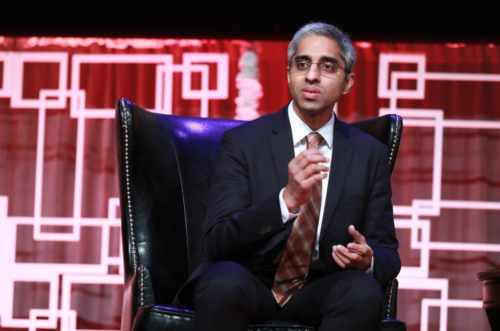Whether it be walking into a room of strangers or standing alone at recess, everyone has felt lonely at some point. Vivek Murthy (SOM ’03), the nineteenth and twenty-first Surgeon General of the US, built his platform on combatting loneliness after realizing how insidious its long-term effects are. In his book Together: The Healing Power of Human Connection in a Sometimes Lonely World, Murthy explains that because loneliness is the root cause of many societal problems, combating loneliness ultimately bolsters our collective health.
Murthy’s childhood role models were his parents. Physicians themselves, they built relationships with their patients by taking time to listen to their needs. When Murthy began his first stint as Surgeon General, he took his parents’ example to heart and embarked on a listening tour across America to identify the most pressing health issues Americans were facing. Between those listed—addiction, violence, anxiety, and depression—there was a common connector. “To be at home is to share a sense of common ground, common interests, pursuits, and values with others who truly care about you. In community after community, I met lonely people who felt homeless even though they had a roof over their heads,” Murthy said.
The link between loneliness and physical health, though surprising when first discovered, is nonetheless an established one. Psychologist Julianne Holt-Lunstad found that loneliness is a stronger risk factor for reduced life span than obesity, alcoholism, and lack of exercise. In fact, lack of social connection is as detrimental to one’s health as smoking fifteen cigarettes a day. “If neglected, loneliness can have long-term health implications, yet it is not a state that can be fixed with a pill or a procedure. It is a human condition that reminds us of our need for the love, compassion, and companionship of fellow human beings,” Murthy said.
Given the current state of social distancing and mandated isolation, it’s likely that loneliness is more prevalent than ever. However, Murthy insists that physical solitude doesn’t necessarily translate to loneliness. “Loneliness is the subjective feeling that you’re lacking the social connections you need. Solitude, by contrast, is a state of peaceful aloneness or voluntary isolation. It is an opportunity for self-reflection and a chance to connect with ourselves without distraction,” Murthy said.
Murthy believes that even in the current pandemic, we can find ways to combat loneliness while finding peace in solitude. He lays out four strategies: 1) spending time each day with those you love, even if it’s fifteen minutes on a video call; 2) giving other people your full, undivided attention when conversing; 3) performing acts of service to be reminded of how we can support each other; and 4) embracing solitude through nature, meditation, and art.
“Developing comfort with solitude is an essential part of strengthening our connection to ourselves, and by extension, enabling our connection with others. Solitude, paradoxically, protects against loneliness,” Murthy said. Even in the despair of this past year, there may be a hidden blessing if one ascribes to Murthy’s teachings.

